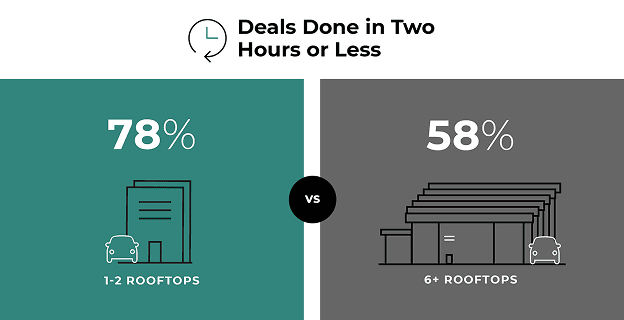3 Min Read • September 23, 2025
3 Ways Community Dealers Stand Apart

The automotive retail industry is as diverse as any other in the United States. There are large, publicly traded operators and family-owned stores that have been handed down for generations. In fact, the majority of this country’s car dealerships are operated independently and many are in smaller towns and suburbs far from major metro areas.
These stores are community-focused at their core, and CDK has spent time researching how they operate in unique ways to serve their customers.
1. Everyone Wears Multiple Hats
The larger an operation the more specialized roles are filled across the store, and sometimes, many rooftops. At a community dealer, the staff size falls between five and 15 people. That means a salesperson may be playing Porter and F&I Manager. And while that may seem overwhelming, community dealers are proven to get deals done faster.

CDK research also shows that fewer salespeople had to wait for a Sales Manager in these stores, perhaps because there were fewer levels of management to deal with. These salespeople also reported fewer pain points whether it was empowerment to pencil deals or the handoff with F&I.
2. Relationship-Driven Outreach Fuels Connections
To deliver in your local community, face-to-face and personal communication is the preferred path. While digital tools will facilitate a deal and track how much outreach a store is achieving, the customer expects to hear directly from the dealership personnel. That includes a familiar salesperson or manager and often, especially if a repeat customer, the dealer principal or owner.
Advertising may include targeted digital outlets whether third parties or Facebook Marketplace as an example, but there’s more hyperlocalized spend. That means showing up at high school football games, local churches and, yes, Little League games are still a common home for community dealer logos to show themselves.
Some of these sponsorships have more to them than just a name on a jersey. Some teams include sponsors on all official communications like email and in social media as well. And often, Little League teams are part of a nonprofit organization that can be considered tax-exempt.
3. Reputation Is Everything
From a no-pressure sales experience to the service lane, community dealers understand how every interaction a customer has with the dealership staff is a reflection on the dealership. This goes beyond Google reviews. A bad experience is shared by word of mouth, a form of referral generation that’s stood the test of time and is harder to answer than a negative online review.
This level of trust is a unique strength for community dealers and much harder to capture for larger organizations in denser urban populations. That also means these dealer principals might try to keep a tighter rein on operations and forego exploring new technology. Community dealers generally use just one to three systems across their store while the majority of 6+ rooftop operations use four or more.
No matter the size or location, any dealership can excel by using modern technology, especially if they’re trying to get the most out of fewer, multitasking employees. This is why CDK introduced the CDK Fundamentals Suite to meet the needs of one- to two-site franchise dealers and independent auto dealers. It’s a proven and scalable core business system that leverages the power of CDK's industry-leading technology and data solutions.
Share This









